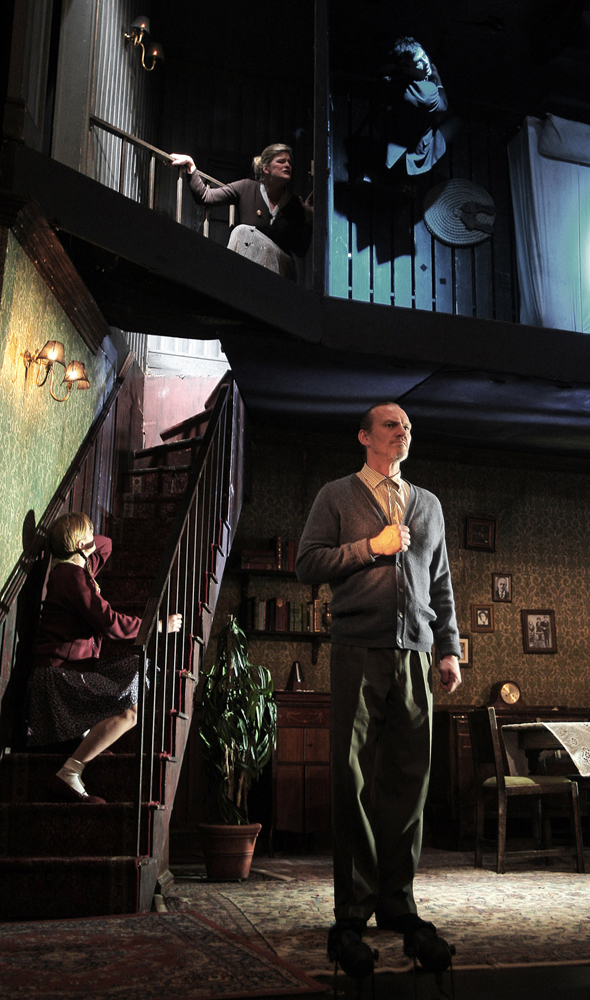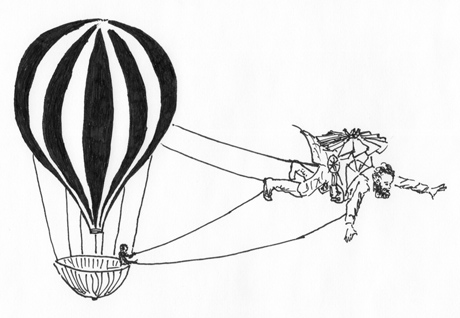Friday, December 10, 2010
Peter Kuper's cartoon of Metamorphosis
Tuesday, November 30, 2010
Monday, November 29, 2010
Macbeth
Act 3 scene 1: the scene opens on Banquo questioning himself about the prophecy. Macbeth's prophecy was realized so why wouldn't his be too? He suspects Macbeth to have done evil things to realize it faster ("thou played'st most foully for't") and he doesn't want to do the same mistakes as Macbeth did. The fact that the third act opens on Banquo shows that we will focus more on him than on Duncan from now on. This is the first time that Macbeth and Banquo speak alone since they have seen the witches and they are beginning to separate. Macbeth lies to Banquo by saying that he doesn't think about the witches, he starts to think like a king replacing "I" by the royal "We". Macbeth asks a lot of questions about what will Banquo do later that night and with whom. He wants to know because he wants to kill him and his son. He isn't secure. When Banquo leaves and Macbeth is alone, he talks about how in front of Banquo his "genius is rebucked". He feels inferior to him because Banquo is such a good person. Banquo is the winner because he will realize his prophecy without corrupting himself; he is more noble than Macbeth. Then Macbeth sends murderers to kill Banquo and Fleance because he already has murderer sleep and guilt so he thinks that it will be easier. The murderers are his alibi. They are so miserable that they would do anything to have a better status. To persuade them, Macbeth says that Banquo is responsible for their misery and he compares them to dogs just like Lady Macbeth did to him.
Friday, November 26, 2010
macbeth the monster
Wednesday, November 24, 2010
Gods, Monsters and Men
We have been having a philosophical discussion on the nature of man and the nature of monsters. We've spoken of monsters before, and of men who wish to be God, but what, then, is a man? How does Shakespeare invite us to answer this question?
Monday, November 15, 2010
Saturday, November 13, 2010
Poets are watchers of the skies too!
| John Keats. 1795–1821 |
| 634. On first looking into Chapman's Homer |
| MUCH have I travell'd in the realms of gold, | |
| And many goodly states and kingdoms seen; | |
| Round many western islands have I been | |
| Which bards in fealty to Apollo hold. | |
| Oft of one wide expanse had I been told | 5 |
| That deep-brow'd Homer ruled as his demesne: | |
| Yet did I never breathe its pure serene | |
| Till I heard Chapman speak out loud and bold: | |
| Then felt I like some watcher of the skies | |
| When a new planet swims into his ken; | 10 |
| Or like stout Cortez, when with eagle eyes | |
| He stared at the Pacific—and all his men | |
| Look'd at each other with a wild surmise— | |
| Silent, upon a peak in Darien. |
Friday, November 12, 2010
Thursday, November 11, 2010
Science vs. Imagination (or L vs. S)
Sunday, November 7, 2010
Lady Macbeth is a strong willed woman that loves to be in control. She enjoys dictating her husband telling him what to do .Her main flaw is that she is too controlling she wants things done her way, and stays true to her words . She is avery manipulative woman. Her redeeming quality is that she is a very smart woman she planned the murder of Duncan to the last detail. We could say that her plan was a very good one for the exception of Macbeth not telling her about Malcolm the successor of Duncan. I feel as though Shakespeare is denouncing woman in this book in general. We see through the three witches and lady Macbeth that woman are deceitful creatures. They charm you. Macbeth was charmed by the witches who told him that he will be king. Lady macbeth is encouraging him to commit murder she is pushing him to go along with the plan. Macbeth respects her because he knows what she is capable of. We saw that she has no problem killing the king. She would have done so if he did not look like her father. Macbeth fears her in a way because she is capable of doing what he isn't. That is why she takes the lead in their marriage.
Saturday, November 6, 2010
Monday, November 1, 2010
Thursday, October 28, 2010
Wednesday, October 20, 2010
The Scottish Play.....
Hover through the fog and the filthy air."
Not much plot in that--so what have we learned about what this play will be about?
Friday, October 8, 2010
Thursday, October 7, 2010
The Bride of Frankenstein
In this version of Frankenstein, Victor actually creates a partner for Creature. However, things don't turn out so well... You guys should watch the movie!
Creature's crimes
A couple of hours ago, an idea came into my head. It was about the Creature's crimes as the title says. In class, we talked about whether Creature was redeemable or not. Some people said that he continued killing knowing he was doing something wrong making it impossible to forgive him, and I just wanted to add to that.
Creature was never regarded as a human being and therefore he had no obligation to follow any human laws including the one saying that killing a human being is a crime. Humans couldn't call him a criminal or a serial killer because he was inhuman and he later became inhumane. What I'm trying to say is that Creature did not commit any human crime therefore he needs to be judged differently from how a normal serial killer would, but that fact is also pro the idea that creature=monster. That’s pretty much all. I just want to know what you all think about this fact. Feel free to contradict me if you want or add to it.
Friday, October 1, 2010
"I am your master--obey!"
Thursday, September 30, 2010
Sunday, September 26, 2010
I hope you agree with Lea that the excerpt from the Frankenstein movie is epic! I think so too!! Do check out Bride of Frankenstein as well and take a look at the Gods and Monsters trailer on the blog. Even scarier than Frankenstein, I think, is Nosferatu, the vampire film from the silent screen era...woah. That will keep you up at night!
Tomorrow, you'll be doing some in class writing about chapters 11 through 16, but first I'm going to want to talk about two things the creature and Victor say to each other before he tells his tale:
Creature to Victor: "how dare you sport thus with life?"
Victor to Creature: "there can be no community between us"
Think about it. blog about it...We need to get some ideas going on the blog. Be the first! Remember you all have to go there!
I put Alex's notes up and will put last week's notes up when I get them--who took them? Laura, I think?
The new chapters will keep us busy until Thursday.
Read chapters 17-20 for Friday and finish the book for next Monday.
Wednesday, September 22, 2010
Faust
Once idealistic, he is now disillusioned and bitter with despair. He foresakes God and makes a perilous deal with the Devil in which he commits his soul to eternal damnation in return for power and knowledge in this life.
The legend has inspired many great writers, musicians, and other artists. The two most famous works on the Faust theme are Christopher Marlowe’s The Tragical History of Doctor Faustus, and Johann Wolfgang Von Goethe’s Faust.
Tuesday, September 21, 2010
Friday, September 17, 2010
Sheet of the Week
Dear oib class,
Things are about to get very interesting....who is this weird hitchhiker that just got on Walton's boat? Why is he so picky about where Walton is going? What is he like? Is this the friend Walton was hoping for? These pressing questions were left on the table...That's what's called a cliffhanger. So on Monday, we'll start with these. Then, we'll move into our next narrative box, the first five chapters of Victor Frankenstein's narrative.."I am by birth a Genevese..."
Please read chapters 6-10 for Wednesday. I'll probably have you do some in class writing on your reading in the first hour.
Expect to read through chapter 16 for the following Monday.
I hope you're enjoying the book so far. It's one of my favorites :)
I'll be working on our blog and I'll send it to you when it's done. I'll ask you then to sign up as a follower so you can contribute to it on a regular basis.
Have a great weekend!!
Frankenstein!!
ghost tales hail all the way back to the Gothic novels of the 18th century, stories that take place in the moonlight of imagination, in the dark, in remote, ruinous castles in far away, foreign places (Germany and Eastern Europe, often) where creatures of the night lurk. The Romantics often used the mystery of the Middle Ages as a backdrop to their supernatural tales.
Tuesday, September 7, 2010
Welcome!
Welcome to your blog! Here you will post notes and read each other's ideas. You should check in at least once a week to write an original response and answer a class member. It's your blog. Have fun with it!








